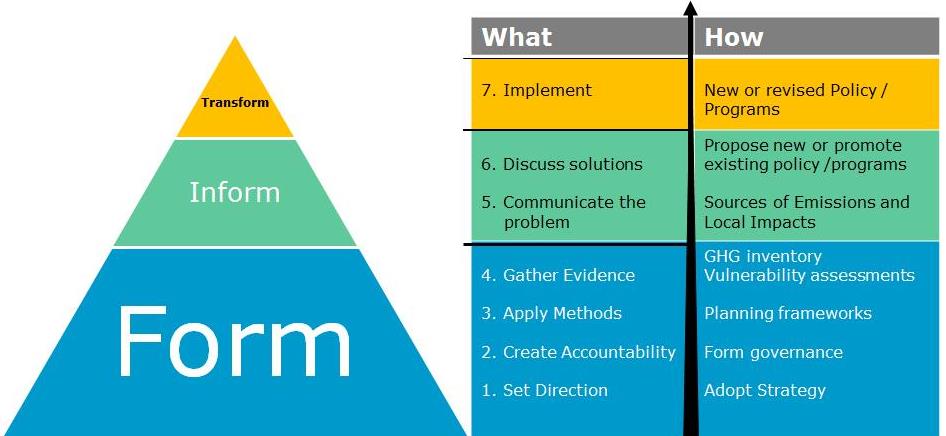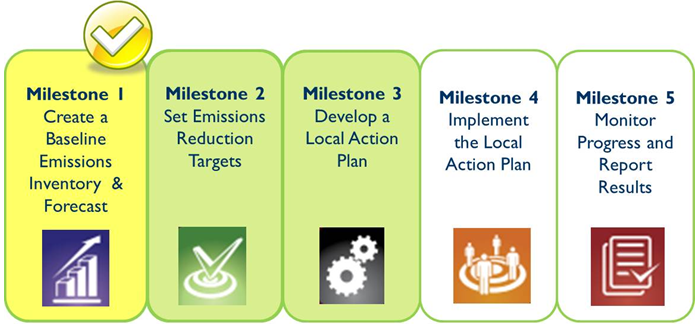August 18, 2016
Peel Climate Change Partnership – Collaborating for Strategic Implementation
By Mark Pajot
Our Roots
The Peel Climate Change Partnership comprises of members from the cities of Brampton and Mississauga, the Town of Caledon, Toronto and Region Conservation Authority (TRCA) and Credit Valley Conservation (CVC) (The Partners). The Partnership was formed to implement 38 actions outlined in the Peel Climate Change Strategy which was adopted by Regional Council in 2011. The Strategy was designed to set out a long-term approach to address the impacts of climate change and reduce greenhouse gas emissions within the Geographic boundary of Peel Region.
How We Function
The Partnership is coordinated and administered by planning staff from the Region of Peel. An informal governance structure (see below) was set up to advise report and monitor progress of achieving actions from the strategy.

Our Operating Model, Values and Purpose
The Partnership recently underwent a five year strategic review which resulted in a new operating model founded on the principles of the Partnership needing to be more Purposeful, Productive and Predicable.
The values outlined in the strategy have been maintained and include being.
- Open, honest and accountable
- Sharing and integrating
- Collaborating
- Demonstrate Leadership
Partners agree that we need to work together to transition to a low carbon and resilient future in Peel.
Our Approach
The approach to planning is broken out into three phases FORM | INFORM | TRANSFORM as illustrated below. The first FORM phase is coming to completion.

Our Planning Process
We have adopted well-established planning frameworks used by communities across Canada to guide climate change planning efforts.
ICLEI Canada’s 5 step Building Adaptive and Resilient Communities Framework (ICLEI BARC) has been put in place to guide adaptation planning:

The Federation of Canadian Municipalities’ Partners for Climate Protection (PCP) framework has been adopted for mitigation planning.

Our Accomplishments
The majority of actions identified in the Strategy have been started by one or more partner with the majority of effort being placed on adaptation related initiatives particularly in the area of research.
One climate trends report and six vulnerability assessments have been completed the results of which are being summarized in a report for decision makers.
The following sectors have been assessed for potential vulnerability from climate change impacts:
- Public Health
- Natural Systems
- Agriculture
- Water infrastructure
- Near Shore Assets; and
- The Economy
The Ontario Climate Consortium has been instrumental in providing vital technical expertise, knowledge, and resources to develop, initiate, coordinate and support research on climate trends and futures, natural systems, agriculture, nearshore assets, and collaborated on efforts to host workshops and draft a summary report for decision makers.
Final Thoughts
Despite the massive effort to build the infrastructure for climate change planning in Peel, there remains substantial institutional and governance barriers within and between all partner agencies that prevents appropriate collaborative high impact actions from being implemented on the ground where it matters. That said, with the recent changes taking place at the federal and provincial level that has made climate change a policy priority for planning and decision making across ministries and departments, Peel and Partners are well positioned to work through the Partnership to take advantage of the emerging leadership. Our efforts in Peel to strengthen the Partnership has been tough but worth it.
Having recently “renewed our vows”, Partners are optimistic that we are entering a new era in Canada where our quality of life will be measured as much by economic progress as by how well we protect and preserve our environment, health and social well-being.
About the Author
Mark Pajot is one of Canada’s first Climate Change Principal Planners. He has over ten years’ experience conducting research, policy and program planning in public health at the federal and local level. He’s published numerous peer reviewed articles on the subject of climate change and has spoken at numerous public health, planning and engineering conferences and events.






Comments are closed here.